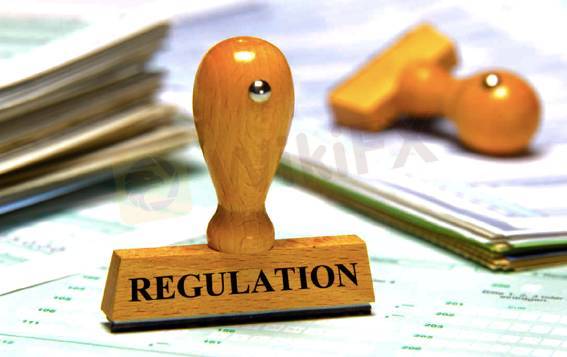2024-09-23 17:57
IndustryForex Regulations: Safeguarding Investors.
The foreign exchange (Forex) market, with its decentralized and global nature, poses unique regulatory challenges. Effective Forex regulations are crucial to protect investors, maintain market stability, and prevent illicit activities.
_Importance of Forex Regulations_
1. _Investor Protection_: Safeguard against fraudulent practices, scams, and unfair trading conditions.
2. _Market Stability_: Prevent market manipulation, ensure fair price formation, and maintain liquidity.
3. _Prevention of Illicit Activities_: Combat money laundering, terrorist financing, and other financial crimes.
_Key Regulatory Bodies_
1. _Commodity Futures Trading Commission (CFTC)_: US regulator overseeing Forex trading.
2. _National Futures Association (NFA)_: Self-regulatory organization for US Forex brokers.
3. _Financial Conduct Authority (FCA)_: UK regulator supervising Forex trading.
4. _Securities and Exchange Commission (SEC)_: Oversees Forex trading in various countries.
_Regulatory Framework_
1. _Licensing and Registration_: Brokers must obtain licenses and register with regulatory bodies.
2. _Capital Requirements_: Brokers must maintain minimum capital levels.
3. _Leverage Restrictions_: Limits on leverage to prevent excessive risk-taking.
4. _Disclosure Requirements_: Brokers must provide transparent trading conditions and risk disclosures.
5. _Anti-Money Laundering (AML) and Know-Your-Customer (KYC) Regulations_: Prevent illicit activities.
_Regional Regulatory Differences_
1. _US_: Strict regulations, high capital requirements.
2. _EU_: Harmonized regulations, emphasis on investor protection.
3. _Asia_: Varying regulations, some countries with lax oversight.
_Challenges and Future Directions_
1. _Keeping Pace with Technology_: Regulating cryptocurrencies and automated trading.
2. _Global Coordination_: Standardizing regulations across jurisdictions.
3. _Enhancing Enforcement_: Strengthening penalties for non-compliance.
_Conclusion_
Forex regulations are essential for maintaining market integrity, protecting investors, and preventing illicit activities. Regulatory bodies must continually adapt to emerging challenges and technological advancements.
_Recommendations_
1. Regulatory bodies: Enhance cooperation, standardize regulations.
2. Brokers: Prioritize transparency, compliance.
3. Investors: Educate themselves on regulatory requirements.
_Additional Resources_
1. Regulatory body websites (CFTC, NFA, FCA, SEC).
2. Forex industry associations (e.g., FXPA).
3. Online forums and communities.
By understanding Forex regulations, investors and market participants can navigate the complex Forex landscape with confidence.
Like 0

大青衣
Trader
Hot content
Industry
Event-A comment a day,Keep rewards worthy up to$27
Industry
Nigeria Event Giveaway-Win₦5000 Mobilephone Credit
Industry
Nigeria Event Giveaway-Win ₦2500 MobilePhoneCredit
Industry
South Africa Event-Come&Win 240ZAR Phone Credit
Industry
Nigeria Event-Discuss Forex&Win2500NGN PhoneCredit
Industry
[Nigeria Event]Discuss&win 2500 Naira Phone Credit
Forum category

Platform

Exhibition

Agent

Recruitment

EA

Industry

Market

Index
Forex Regulations: Safeguarding Investors.
 | 2024-09-23 17:57
| 2024-09-23 17:57
The foreign exchange (Forex) market, with its decentralized and global nature, poses unique regulatory challenges. Effective Forex regulations are crucial to protect investors, maintain market stability, and prevent illicit activities.
_Importance of Forex Regulations_
1. _Investor Protection_: Safeguard against fraudulent practices, scams, and unfair trading conditions.
2. _Market Stability_: Prevent market manipulation, ensure fair price formation, and maintain liquidity.
3. _Prevention of Illicit Activities_: Combat money laundering, terrorist financing, and other financial crimes.
_Key Regulatory Bodies_
1. _Commodity Futures Trading Commission (CFTC)_: US regulator overseeing Forex trading.
2. _National Futures Association (NFA)_: Self-regulatory organization for US Forex brokers.
3. _Financial Conduct Authority (FCA)_: UK regulator supervising Forex trading.
4. _Securities and Exchange Commission (SEC)_: Oversees Forex trading in various countries.
_Regulatory Framework_
1. _Licensing and Registration_: Brokers must obtain licenses and register with regulatory bodies.
2. _Capital Requirements_: Brokers must maintain minimum capital levels.
3. _Leverage Restrictions_: Limits on leverage to prevent excessive risk-taking.
4. _Disclosure Requirements_: Brokers must provide transparent trading conditions and risk disclosures.
5. _Anti-Money Laundering (AML) and Know-Your-Customer (KYC) Regulations_: Prevent illicit activities.
_Regional Regulatory Differences_
1. _US_: Strict regulations, high capital requirements.
2. _EU_: Harmonized regulations, emphasis on investor protection.
3. _Asia_: Varying regulations, some countries with lax oversight.
_Challenges and Future Directions_
1. _Keeping Pace with Technology_: Regulating cryptocurrencies and automated trading.
2. _Global Coordination_: Standardizing regulations across jurisdictions.
3. _Enhancing Enforcement_: Strengthening penalties for non-compliance.
_Conclusion_
Forex regulations are essential for maintaining market integrity, protecting investors, and preventing illicit activities. Regulatory bodies must continually adapt to emerging challenges and technological advancements.
_Recommendations_
1. Regulatory bodies: Enhance cooperation, standardize regulations.
2. Brokers: Prioritize transparency, compliance.
3. Investors: Educate themselves on regulatory requirements.
_Additional Resources_
1. Regulatory body websites (CFTC, NFA, FCA, SEC).
2. Forex industry associations (e.g., FXPA).
3. Online forums and communities.
By understanding Forex regulations, investors and market participants can navigate the complex Forex landscape with confidence.
Like 0
I want to comment, too
Submit
0Comments

There is no comment yet. Make the first one.

Submit
There is no comment yet. Make the first one.